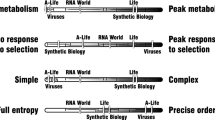Abstract
Life is a self-maintaining process based on metabolism. Something is said to be alive when it exhibits organization and is actively involved in its own continued existence through carrying out metabolic processes. A life is a spatio-temporally restricted event, which continues while the life processes are occurring in a particular chunk of matter (or, arguably, when they are temporally suspended, but can be restarted at any moment), even though there is continuous replacement of parts. Life is organized in discrete packages, particular cells and multicellular organisms with differing degrees of individuality. Biological species, too, have been shown to be individuals, and not classes, as these collections of organisms are spatio-temporally localized, restricted, continuous, and somewhat cohesive entities, with a definite beginning and end. Assuming that all life on Earth has a common origin, all living organisms, cells, and tissues descending from this origin exhibit continuity of the life processes at the cellular level, as well as many of the features that define the individual character of species: spatio-temporal localization and restriction, continuity, historicity, and cohesiveness. Therefore, life on Earth is an ontological individual. Independent origins of life will have produced other such individuals. These provisionally called ‘life-individuals’ constitute a category of organization of life which has seldom been recognized. The discovery of at least one independent life-individual would go a long way toward the project of the universality of biology.
Similar content being viewed by others
Notes
For a beautiful account of the evolution of mitochondria, see Nick Lane's (2006) ‘Power, Sex, Suicide'.
References
Andersson JO (2005) Lateral gene transfer in eukaryotes. Cell Mol Life Sci 62:1182–1197. doi:10.1007/s00018-005-4539-z
Baum DA (1998) Individuality and the existence of species through time. Syst Biol 47:641–653. doi:10.1080/106351598260644
Bhattacharya D, Pelletreau KN, Price DC, Sarver KE, Rumpho ME (2013) Genome analysis of Elysia chlorotica egg DNA provides no evidence for horizontal gene transfer into the germ line of this kleptoplastic mollusc. Mol Biol Evol 30:1843–1852. doi:10.1093/molbev/mst084
Bock R (2010) The give-and-take of DNA: horizontal gene transfer in plants. Trends Plant Sci 15:11–22. doi:10.1016/j.tplants.2009.10.001
Boto L (2014) Horizontal gene transfer in the acquisition of novel traits by metazoans. Proc R Soc B 281:20132450. doi:10.1098/rspb.2013.2450
Buss LW (1987) The evolution of individuality. Princeton University Press, Princeton
Douglas T, Powell R, Savulescu J (2013) Is the creation of artificial life morally significant? Stud Hist Philos Biol Biomed Sci 44:688–696. doi:10.1016/j.shpsc.2013.05.016
Feldman F (1992) Confrontations with the reaper: a philosophical study of the nature and value of death. Oxford University Press, Oxford
Ghiselin M (1966) On psychologism in the logic of taxonomic controversies. Syst Zool 26:207–215
Ghiselin M (1974) A radical solution to the species problem. Syst Zool 23:536–544
Godfrey-Smith P (2009) Darwinian populations and natural selection. Oxford University Press, Oxford
Gould SJ (1989) Wonderful life: the Burgess Shale and the nature of history. W.W. Norton & Company, New York
Hull DL (1976) Are species really individuals? Syst Zool 25:174–191
Hull DL (1978) A matter of individuality. Philos Sci 45:335–360
Joyce GF (1994) Foreword. In: Deamer DW, Fleischaker GR (eds) Origins of life: the central concepts. Jones and Bartlett, Boston
Kluge AG (1990) Species as historical individuals. Biol Philos 5:417–431. doi:10.1007/BF02207380
Lane N (2006) Power, sex, suicide: mitochondria and the meaning of life. Oxford University Press, Oxford
Leslie J (2010) The risk that humans will soon be extinct. Philosophy 85:447–463. doi:10.1017/S0031819110000446
Liu H, Fu Y, Jiang D, Li G, Xie J, Cheng J, Peng Y, Ghabrial SA, Yi X (2010) Widespread horizontal gene transfer from double-stranded RNA viruses to eukaryotic nuclear genomes. J Virol 84:11876–11887. doi:10.1128/JVI.00955-10
Maynard Smith J, Szathmary E (1997) The major transitions in evolution. Oxford University Press, Oxford
Mayr E (1987) The ontological status of species: scientific progress and philosophical terminology. Biol Phil 2:145–166. doi:10.1007/BF00057959
McGhee G (2011) Convergent evolution: limited forms most beautiful. The MIT Press, Cambridge
Okasha S (2008) Evolution and the levels of selection. Oxford University Press, Oxford
Pierce SK, Fang X, Schwartz JA, Jiang X, Zhao W, Curtis NE, Kocot KM, Yang B, Wang J (2012) Transcriptomic evidence for the expression of horizontally transferred algal nuclear genes in the photosynthetic sea slug, Elysia chlorotica. Mol Biol Evol 29:1545–1556. doi:10.1093/molbev/msr316
Queller DC, Strassmann JE (2009) Beyond society: the evolution of organismality. Philos Trans R Soc B 364:3143–3155. doi:10.1098/rstb.2009.0095
Rolston H III (1986) Philosophy gone wild: essays in environmental ethics. Prometheus, Amherst
Ruiz-Mirazo K, Peretó J, Moreno A (2004) A universal definition of life: autonomy and open-ended evolution. Orig Life Evol B 34:323–346. doi:10.1023/B:ORIG.0000016440.53346.dc
Rumpho ME, Worful JM, Lee J, Kannan K, Tyler MS, Bhattacharya D, Moustafa A, Manhart JR (2008) Horizontal gene transfer of the algal nuclear gene psbO to the photosynthetic sea slug Elysia chlorotica. Proc Natl Acad Sci USA 105:17867–17871. doi:10.1073/pnas.0804968105
Sandler RL (2012) The ethics of species: an introduction. Cambridge University Press, Cambridge
Schrödinger E (1944) What is life? The physical aspect of the living cell. Cambridge University Press, Cambridge
Schwartz JA, Curtis NE, Pierce SK (2014) FISH labeling reveals a horizontally transferred algal (Vaucheria litorea) nuclear gene on a sea slug (Elysia chlorotica) chromosome. Biol Bull 227:300–312
Scheffler S, Kolodny N (2013) Death and the Afterlife. Oxford University Press, Oxford
Simpson C (2011) How many levels are there? How insights from evolutionary transitions in individuality help measure the hierarchical complexity of life. In: Calcott B, Sterelny K (eds) The major transitions in evolution revisited. The MIT Press, Cambridge
Sterelny K (2011) Evolvability reconsidered. In: Calcott B, Sterelny K (eds) The major transitions in evolution revisited. The MIT Press, Cambridge
Sterelny K, Griffiths PE (1999) Sex and death: an introduction to philosophy of biology. University of Chicago Press, Chicago
van Inwagen P (1990) Material beings. Cornell University Press, Ithaca
Author information
Authors and Affiliations
Corresponding author
Rights and permissions
About this article
Cite this article
Hermida, M. Life on Earth is an individual. Theory Biosci. 135, 37–44 (2016). https://doi.org/10.1007/s12064-016-0221-2
Received:
Accepted:
Published:
Issue Date:
DOI: https://doi.org/10.1007/s12064-016-0221-2




